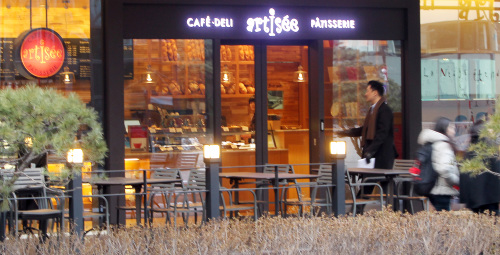Samsung, LG, Hyundai bow to criticism over reckless expansion
Amid criticism over their excessive expansion, Korea’s major corporations are relaying to withdraw from bakeries, cafes and other markets that have long been crowded with neighborhood stores.
Hyundai Motor Group on Friday became the latest conglomerate to back down from its cafe business. Chung Sung-yi, the eldest daughter of chairman Chung Mong-koo, has been managing two branches of Ozen at the automaker’s headquarters in Seoul and its affiliated hotel on Jeju Island.
The auto giant initially tried to defend its corner by tagging the coffee shops as “welfare facilities” where company employees get snacks and beverages.
Caving to growing public and political strain, however, the corporation shifted its policy to transform the cafes into lounges for workers and guests instead.
Earlier on Thursday, Hotel Shilla, run by Samsung Electronics chairman Lee Kun-hee’s eldest daughter Lee Boo-jin, said it will retire from its upscale bakery chain Artisee. The company raked in 24.1 billion won ($21.5 million) in sales last year from its 27 branches throughout Seoul.
 |
Pedestrians pass by Hotel Shilla-affiliated bakery cafe Artisee in downtown Seoul on Thursday. (Yonhap News) |
Our Home, a food materials provider spun off from LG Group, also announced its withdrawal from businesses involving the sale of traditional Korean foodstuff such as fermented soybeans and sundae, or blood sausage. The two items were categorized last year as SME-only areas by the Commission on Shared Growth for Large and Small Companies, a presidential panel aimed at enhancing co-prosperity across business spectrums.
The conglomerates’ decisions come on the heels of mounting criticism that the industry giants stifle the livelihoods of small business owners amid growing public resentment over social inequalities.
In August, Samsung, SK and other groups pulled out from business entailing procuring maintenance, repair and operation supplies, many of which were operated by the children of their owners. Critics blasted the practice, labeling the MRO affiliates as a method to dodge taxes and amass wealth within their families.
On Wednesday, President Lee Myung-bak called on conglomerates to refrain from penetrating fields dominated by mom-and-pop stores.
“Second- or third-generation chaebol offspring may be running the business as a hobby, but it is a matter of survival for the people running bakeries,” Lee told a meeting with senior secretaries.
“They have not only been entrenching on small and medium enterprises but also neighborhood markets now.”
According to the Korea Federation of Small and Medium Business, the number of local bakeries run by self-employed entrepreneurs plummeted to about 4,000 last year from around 18,000 in 2003.
In stark contrast, Paris Baguette, a leading bakery chain, has more than 3,000 branches nationwide, about 300 of which were opened last year alone. Tous les Jours, its rival owned by CJ Group, runs around 1,400 stores.
After a months-long dormancy, retail giants appear to be pushing again for large stores known as super-supermarkets, which fanned fierce protests among smaller local shops in late 2010.
Lotte Group, the largest SSM operator, recently added 175 new units to its existing 350 Lotte Supers by taking over CS Mart, a local grocery chain. Homeplus runs 248 branches nationwide of its smaller franchise, Homeplus Express, while GS Retail operates 209 GS Supermarkets.
E-Mart, a latecomer to the race, said Friday it has received approval from the country’s antitrust regulator for its acquisition of SM Mart, a Gyeonggi-based mid-size supermarket operator.
With 28 SM Marts, the Shinsegae affiliate now has 100 outlets nationwide, including E-Mart Everyday and Kim’s Club.
By Shin Hyon-hee (
heeshin@heraldcorp.com)








